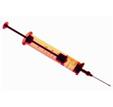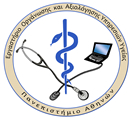Symptoms/ Early signs
Most people who get infected with HIV present a flu-like illness, within 2 to 6 weeks after being infected, with symptoms including:
|
|
|
|
|
|
|
|
|
|
|
|
|
|
Τhe abovementioned symptoms may be caused by other diseases as well and do not necessarily mean that you are infected with the virus. However, if you present several of the said symptoms and suspect that you may have been infected, you should be tested for HIV. After the early symptoms go away, HIV frequently does not present other symptoms for many years, however it continues to grow in the body and attacks the immune system. AIDS is the final stage of HIV infection, when the body can't fight off life-threatening infections.
Symptoms - Advanced stage
|
|
|
|
|
|
|
|
|
|
|
|
|
|
|
|
|
|
|
|
At this stage there is increased risk for life-threatening diseases such as tuberculosis, pneumonia and several types of cancer
How is HIV transmitted




- through sexual contact (anal, vaginal or oral) without condom
- by sharing needles, razors, syringes with an infected person
- through mother-to-child transmission: from a mother to her newborn child during gestation, during childbirth or through breast-feeding
















